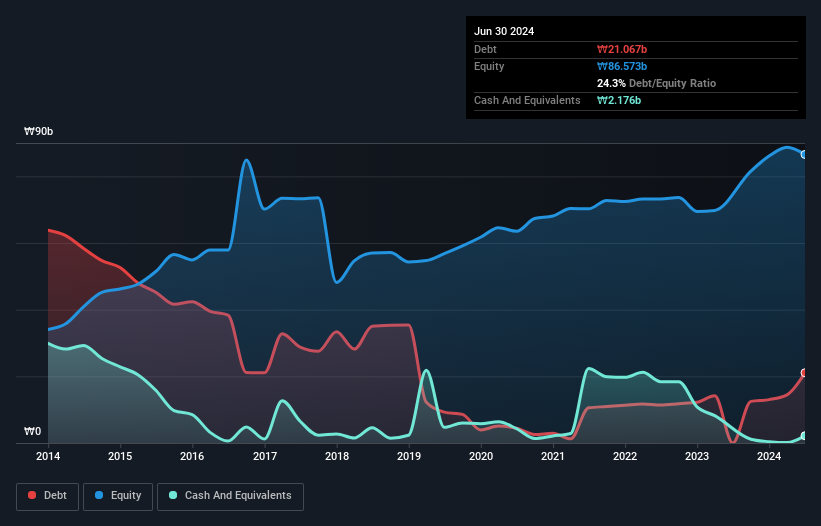The external fund manager backed by Berkshire Hathaway's Charlie Munger, Li Lu, makes no bones about it when he says 'The biggest investment risk is not the volatility of prices, but whether you will suffer a permanent loss of capital.' When we think about how risky a company is, we always like to look at its use of debt, since debt overload can lead to ruin. Importantly, EcoBio Holdings Co., Ltd. (KOSDAQ:038870) does carry debt. But is this debt a concern to shareholders?
What Risk Does Debt Bring?
Generally speaking, debt only becomes a real problem when a company can't easily pay it off, either by raising capital or with its own cash flow. Part and parcel of capitalism is the process of 'creative destruction' where failed businesses are mercilessly liquidated by their bankers. However, a more frequent (but still costly) occurrence is where a company must issue shares at bargain-basement prices, permanently diluting shareholders, just to shore up its balance sheet. Of course, debt can be an important tool in businesses, particularly capital heavy businesses. The first step when considering a company's debt levels is to consider its cash and debt together.
View our latest analysis for EcoBio Holdings
What Is EcoBio Holdings's Net Debt?
The image below, which you can click on for greater detail, shows that at June 2024 EcoBio Holdings had debt of ₩21.1b, up from none in one year. However, it does have ₩2.18b in cash offsetting this, leading to net debt of about ₩18.9b.

How Strong Is EcoBio Holdings' Balance Sheet?
Zooming in on the latest balance sheet data, we can see that EcoBio Holdings had liabilities of ₩25.9b due within 12 months and liabilities of ₩13.0b due beyond that. Offsetting this, it had ₩2.18b in cash and ₩38.9b in receivables that were due within 12 months. So it can boast ₩2.12b more liquid assets than total liabilities.
This short term liquidity is a sign that EcoBio Holdings could probably pay off its debt with ease, as its balance sheet is far from stretched. There's no doubt that we learn most about debt from the balance sheet. But it is EcoBio Holdings's earnings that will influence how the balance sheet holds up in the future. So when considering debt, it's definitely worth looking at the earnings trend. Click here for an interactive snapshot.
In the last year EcoBio Holdings's revenue was pretty flat, and it made a negative EBIT. While that hardly impresses, its not too bad either.
Caveat Emptor
Over the last twelve months EcoBio Holdings produced an earnings before interest and tax (EBIT) loss. Indeed, it lost ₩4.7b at the EBIT level. On a more positive note, the company does have liquid assets, so it has a bit of time to improve its operations before the debt becomes an acute problem. But we'd want to see some positive free cashflow before spending much time on trying to understand the stock. This one is a bit too risky for our liking. When analysing debt levels, the balance sheet is the obvious place to start. But ultimately, every company can contain risks that exist outside of the balance sheet. We've identified 3 warning signs with EcoBio Holdings , and understanding them should be part of your investment process.
At the end of the day, it's often better to focus on companies that are free from net debt. You can access our special list of such companies (all with a track record of profit growth). It's free.
Valuation is complex, but we're here to simplify it.
Discover if EcoBio Holdings might be undervalued or overvalued with our detailed analysis, featuring fair value estimates, potential risks, dividends, insider trades, and its financial condition.
Access Free AnalysisHave feedback on this article? Concerned about the content? Get in touch with us directly. Alternatively, email editorial-team (at) simplywallst.com.
This article by Simply Wall St is general in nature. We provide commentary based on historical data and analyst forecasts only using an unbiased methodology and our articles are not intended to be financial advice. It does not constitute a recommendation to buy or sell any stock, and does not take account of your objectives, or your financial situation. We aim to bring you long-term focused analysis driven by fundamental data. Note that our analysis may not factor in the latest price-sensitive company announcements or qualitative material. Simply Wall St has no position in any stocks mentioned.
About KOSDAQ:A038870
EcoBio Holdings
Engages in the development, investment, operation, and sale of renewable energy business in South Korea.
Low risk with worrying balance sheet.
Market Insights
Community Narratives




